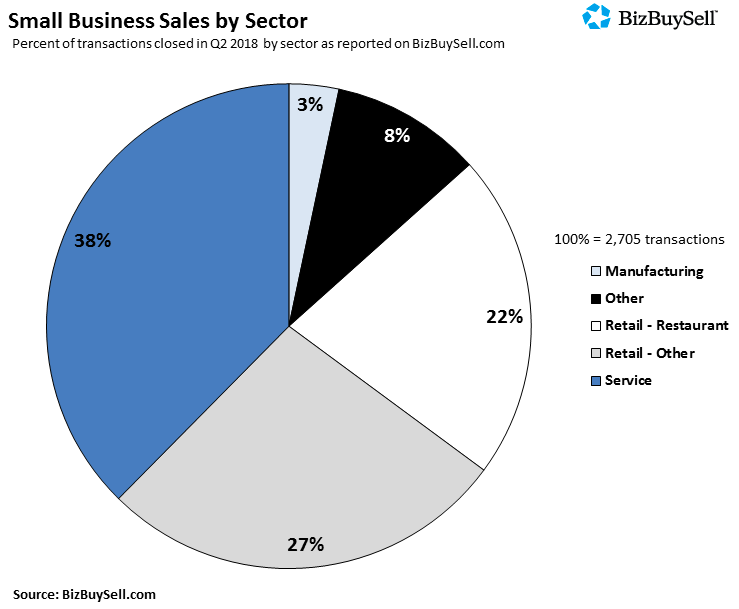The $526,048 median revenue of businesses sold in the second quarter reached a new high with a 7.4 percent increase from last year, while median cash flow grew 3.4 percent to $120,000. These stronger financials are catalysts for gains in asking and sale prices over the past year. Asking prices increased 4 percent from Q2 of last year to $260,000, raising the median sale price 4.4 percent to $239,000.
While buyers are dishing out a little more at the negotiating table, BizBuySell data reflects a win-win for both parties. Sellers get a little extra cash from the deal, while buyers are taking ownership of businesses with better financial footing. The former is of special importance to the growing number of Baby Boomers relinquishing their business in turn for the reward of retirement.
For those yet to take advantage of the hot market, for-sale data shows that it's still an opportune time to jump in. A 5.1% increase in active listings were reported in the second quarter of 2018 compared to last year, extending a long trend that started in 2012. There are no guarantees in small business, however the state of the economy and demographic trends point to a rising tide. In fact, the National Federation of Independent Business (NFIB) small-business optimism index rose 3 points to 107.8 this past May, the second-highest level in the index's 45-year history.
"The current business-for-sale market is a great reflection of today's economic and demographic environment," Bob House, president of BizBuySell.com and BizQuest.com, said. "As America continues to see a swell of Baby Boomers reach retirement age, the market will likely continue to see a strong inventory of businesses for sale. Meanwhile those same businesses, many of which dug their way out of the last recession, now have the financial performance they need to earn an acceptable sale price."
Transactions Reflect Generational Shift as Baby Boomers Hand Businesses to Younger, More Diverse Buyers
According to BizBuySell's latest demographic survey, Baby Boomers still own the majority share (53 percent) of small businesses. Demographically, these Boomers make up a fairly consistent group, with over 82 percent Caucasian males. Two in three Baby Boomers have owned more than one business and 68 percent have owned their current business for more than 10 years. More importantly for the market, nearly 60 percent of Baby Boomers plan to sell their business within the next two years or less. Based on this data, we don't expect market supply to slow down anytime soon, but some data suggests we could see a shift in the makeup of incoming business owners.
A deeper dive into the demographics of today's market shows a transition to a more diverse group of business owners. Incoming buyers are less likely to identify as Caucasian (65 percent) than current owners as a whole (71 percent). They are younger, with the majority less than 50 years old and despite both groups leaning Republican, buyers are 25 percent more likely to be Democrats.
Politically, immigration remains a hot topic in our country but its impact on the small business community is profound. A third of buyers are non-natural born citizens, and 64 percent of these are first-generation immigrants and another 16 percent are second-generation. That's a big jump from non-natural born citizen current owners, in which just 48 percent are first generation and 10 percent are second generation.
Finally, while women still account for the minority of small business owners (22%), female owner demographics showed a younger, more diverse group as well. For example, twice the percentage of female owners are in their 20s as compared to men. In addition, twice the percentage of female business owners identify as African American compared to men.







